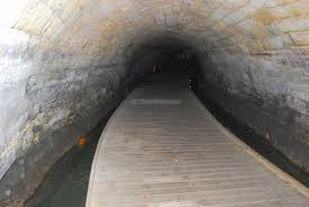How "The Tunnel Effect" Will Keep Your Audience Entertained For Every Major Scene
This tool works.
It will set you apart as a writer. It will get you meetings and it will get your scripts talked about.
Let's Explore "The Tunnel Effect"
Before I tell you exactly how this technique applies to screenwriting, bear with me for a moment, as I get into a brief discussion on the psychology of tunnels...
Obviously we're all familiar with tunnels.
But here's what's fascinating about them: As soon as you enter a tunnel, you have no idea where you are. You may not even be able to see the light at the other end.
As you progress, you get comfortable with your surroundings. You observe more about where you are.
Then, about half way through the tunnel, you can see the other end. The world outside comes into focus piece by piece until finally you've made it through to the other side.
There's something undeniably exhilarating about that. I remember when I was a kid, my sisters and I absolutely loved tunnels. Honestly, I still enjoy a good tunnel to this day.
It's the mystery that hooks us.
The reason tunnels are so captivating is what's known as "The Information Gap."
"The Information Gap Theory of Curiosity" was coined by George Loewenstein, a professor at Carnegie Melon University.
Loewenstein argues that any gap between what people know and what they want to know triggers their innate curiosity. He believes that by creating this gap, you can influence people to take a wide variety of actions.
In screenwriting, this is called "The Tunnel Effect," and it is a sure-fire way to keep your readers turning the page from FADE IN to FADE OUT.
It's surprisingly easy to create this effect in your writing. All you have to do is withhold information at the beginning of your scene.
Parcel important details out gradually, from the top of your scene until its conclusion, and your reader will devour your material, fueled by their natural human curiosity.
The writers on "Breaking Bad" have mastered this:
First, the writers pique our curiosity with images. No one speaks for a good thirty seconds, as the setting and the principle characters are revealed.
Then we begin to wonder: What is Walt doing there? And how the hell is he going to get out of this alive?
We're deep into the tunnel at this point. Shrouded in darkness, with only the occasional sliver of light left to lead the way.
Because the writers don't illuminate too many details, the information we're allowed is invaluable. It's satisfying and it leaves us wanting more.
It's important to note that you do not need to answer every question raised in your scenes. You don't need to get to the end of the tunnel in order to use this technique effectively.
In "Breaking Bad," the entire series is a tunnel. Big questions are raised in every scene, every episode and every season, few of which are answered right away.
Here's What You Can Do:
Every piece of information is precious. Make the audience really earn the answers to the questions that your scenes are raising.
Don't be afraid to rewrite a scene that might benefit from "The Tunnel Effect."
All great screenplays use this technique masterfully, and once you really understand it, it can be effectively applied to both your dialogue and your screenplay as a whole.
Now It's Up To You:
How are you going to apply it to your writing?
Leave a comment below.

